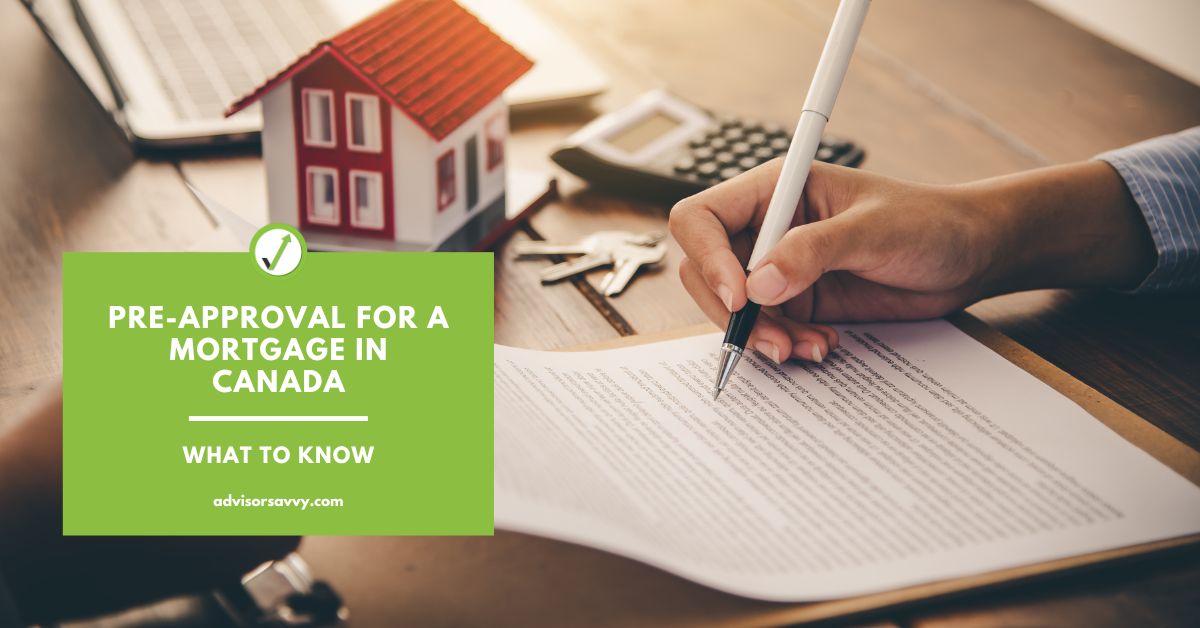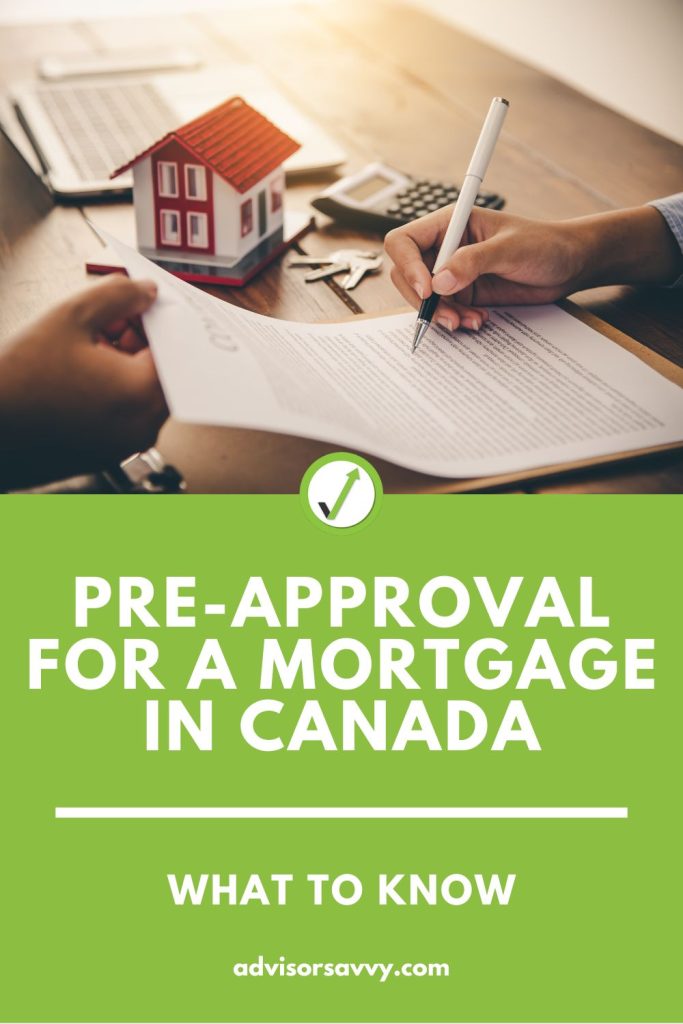
If you’re a first-time home buyer, it can be easy to get caught up in the euphoria of finding the perfect home and leave crucial financial details behind. We know, the financing aspect isn’t exactly as fun as choosing location and interior design! But that doesn’t mean you shouldn’t take the time to assess your financial position and the pathway to securing a mortgage. One of the most vital considerations of a mortgage in Canada should be your budget. More specifically, what you can afford to pay for, what you’ll be able to borrow, and so on. Pre-approval for a mortgage serves as a reference point in the home-buying process, aiding you to keep your home shopping within your financial reach. Further, it gives you an advantage in the competitive real estate market as sellers take you more seriously when you have pre-approval.

Table of contents
If you’re ready to start your home shopping journey, it’ll be a great plus to read through and understand why you may want pre-approval for a mortgage before entering the housing market. You will also find answers to basic questions about pre-approval. Including how to get pre-approved and whether pre-approval affects other areas of your finances, like your credit score. Keep reading to learn more!
Related Reading: Canada Mortgage Stress Test
What is a pre-approval for a mortgage in Canada?
A pre-approval for mortgage in Canada is an optional step in the home buying process. It involves meeting with lenders to determine parameters of a mortgage before you actually enter the housing market and explore options. This means the lender estimates how much you can borrow and at what interest rate, based on the financial information you’ve provided.
As mentioned, pre-approval is not mandatory in Canada. Some choose to find a home they want to buy first, then work out the financing details later. However, pre-approval can help you set and stick to a budget when you’re out shopping for a home. In addition, you will find peace of mind because you know banks are willing to lend to you already.
Other terms that are often used interchangeably for mortgage pre-approval include mortgage prequalification or mortgage preauthorization.
Does pre-approval mean you get the mortgage?
Not necessarily! Pre-approval is not a promise that you’ll get a mortgage for the home you want to buy. It doesn’t guarantee you a loan. Rather, pre-approval is an evaluation process to ascertain that you’re able to afford the house you wish to purchase. After examining your finances, if the lender thinks you qualify for the mortgage loan, they pre-approve you.
The lender issues you a letter when you’re pre-approved, often called a prequalification letter. You will present this document to the seller or realtor of the property. This letter attests to your ability to follow through on a purchase offer, specifying what type of loan you qualify for and at what interest rate. It’s a good bargaining chip in the home buying process and can set you apart from other buyers in the market.
Note that pre-approval is subject to certain conditions. For example, if your financial circumstances change between the time you’re pre-approved and the time you want to apply for a home loan, you may be denied the loan. For instance, if you’re laid off, the lender may deny your loan because you no longer have steady income to cover the mortgage. Although, criteria and conditions vary depending on the lender.
In summary, pre-approval isn’t an absolute guarantee to getting a home loan. However, it’s a step in the right direction as it can accelerate the entire mortgage process.
How long do pre approvals for mortgages last?
The time limit for pre-approval often differs depending on the lender. But in most cases, pre-approvals are valid between 60 to 90 days. Some lenders go well below this benchmark and can issue a 30-day limit for pre-approvals. It’s best to inquire how long a pre-approval will last before you apply and begin shopping. If you’d like more time, consider asking the lender if they can extend their pre-approval timeline.
Do pre-approvals affect credit?
Generally speaking, a pre-approval does not directly impact your credit score until you follow through with the application. This is because once you begin the pre-approval or mortgage application process, the lender conducts thorough research by pulling your credit report to assess your creditworthiness. This results in a hard inquiry, which can impact your credit score negatively. Fortunately, the impact of inquiries on your credit is small and the effects fall off after a short period of time. Eventually, inquiries drop off your report and your credit will recover.
Does it cost to get pre-approved for a mortgage?
Whether or not you’ll have to pay for pre-approval depends on the lender you’re working with. For most lenders, pre-approval is free. It’s one of the most essential steps in helping their clients win a suitable offer and proceed with the mortgage application process. For this reason, they offer free pre-approval with the objective of helping you secure a mortgage which will earn them money in the long term. Although, some lenders may charge you a mortgage pre-approval application fee when you decide to continue the home-buying process. Be sure to inquire before beginning the process so you know what to expect.
Related Reading: Tax Free First Home Savings Account
How to get pre-approved for a mortgage
Now that you know the basic information about pre-approval for a mortgage in Canada, let’s walk you through the process of getting pre-approved. Remember, pre-approval is not mandatory, but it’s recommended by most financial experts because it makes the entire home buying process easier.
What do you need for a pre-approval?
To pre-approve you for a mortgage loan, a lender assesses your financial situation by reviewing your credit, income, and down payment. They might review other information too, such as your monthly expenses and current debt load. If your down payment was gifted, they may ask for additional details about where the funds came from. Ultimately, it depends on the lender and their processes.
Your credit score and report serves as a bedrock for pre-approval because it confirms your ability to pay for the property. More specifically, history of repayment is usually the most important aspect. As for income, the general rule of thumb is the more consistency in income, the better. As such, the lender will require a current proof of income from you. Often, full-time salaried employees are favored by lenders for this reason because they have stable income. However, that’s not to say self-employed people won’t get approved. You may just need to present more details about your income.
The down payment is your initial monetary commitment when buying a home. Currently, mortgage lenders in Canada expect 5% of the property value as a down payment, whether or not you’re a first-time home buyer. Although, the more you can put down, the better. If you put down 20% or more, you can avoid mortgage default insurance.
Your credit score & report. Always free, forever
It takes 3 minutes to join 20+ million people who trust ClearScore to help them improve their financial future
Documentation for pre-approval for mortgage
You’ll have to provide the following documents for pre-approval:
- Government-issued identification (passport, driver’s license, PR card, etc.)
- Pay stub, employment letter, investment statement, or any other proof of verifiable income
- Tax returns and notice of assessments from at least the past two years
- Your social insurance number and other personal information
- Statements showing your debts and other existing financial obligations
- Information about assets you own, such as investment portfolios, properties, and cars
Note that lenders may request more information based on their specific processes and procedures.
Related Reading: Peer-to-Peer Lending in Canada
How early should I get pre-approved for a mortgage?
Most mortgage pre-approvals last up to three months, sometimes less. Unfortunately, three months isn’t a ton of time when it comes to home buying. It can take up to a year, sometimes longer, to find a property you’re seriously ready to buy.
For this reason, use your judgement when determining how early you should get pre-approved. Perhaps you want to casually shop for homes before making the commitment. But when you’ve got the down payment, your credit is good, and you’re ready to secure a home, then begin the pre-approval process. Above all, ensure to consider your unique situations and plan adequately as this can make the process less burdensome.
How fast can you get pre-approved for a mortgage?
There’s no specific length of time to get pre-approved for a mortgage. Although, it will likely take some time, perhaps a few weeks How fast you get pre-approved will largely depend on how soon you’re able to gather and submit the necessary documents.
Other factors to consider include how long it takes your lender to review the financial paperwork and the complexity of your finances. But, all things being equal, once you submit your documents, you should expect feedback within three business days.
For some lenders, however, the duration can be shorter or longer. Some online mortgage lenders process your information and give you a loan estimate within the same business day. Whereas other lenders may take up to a week or more, especially when your financial situation is complicated.
Do I need pre-approval for a mortgage?
Pre-approval for a mortgage in Canada is not mandatory when buying a home and securing financing. However, obtaining pre-approval can help you significantly and make the process smoother overall. To begin, it can help you set a budget when shopping because you know how much of a loan you’re pre-approved for.
Also, pre-approval increases your buying power and credibility. Realtors and sellers are more willing to work with you if you have pre-approval from a lender. It shows you’re serious about the purchase and capable of obtaining a mortgage. In other words, you have an advantage in an already competitive and hot real estate market.
Lastly, pre-approval can accelerate your home-buying process. It allows you to move faster when you’re ready to make an offer. You don’t have to go through the overwhelming circles of choosing and canceling out. Rather, you determine what price range to stay within, peruse homes in that range, quickly make a choice, and make an offer.
If you’re ready to get pre-approved for a mortgage, but aren’t sure where to start, a financial advisor can help. Complete this quick questionnaire to get matched with one today!
Read More: Mistakes to Avoid When Paying Off Your Mortgage Early in Canada

